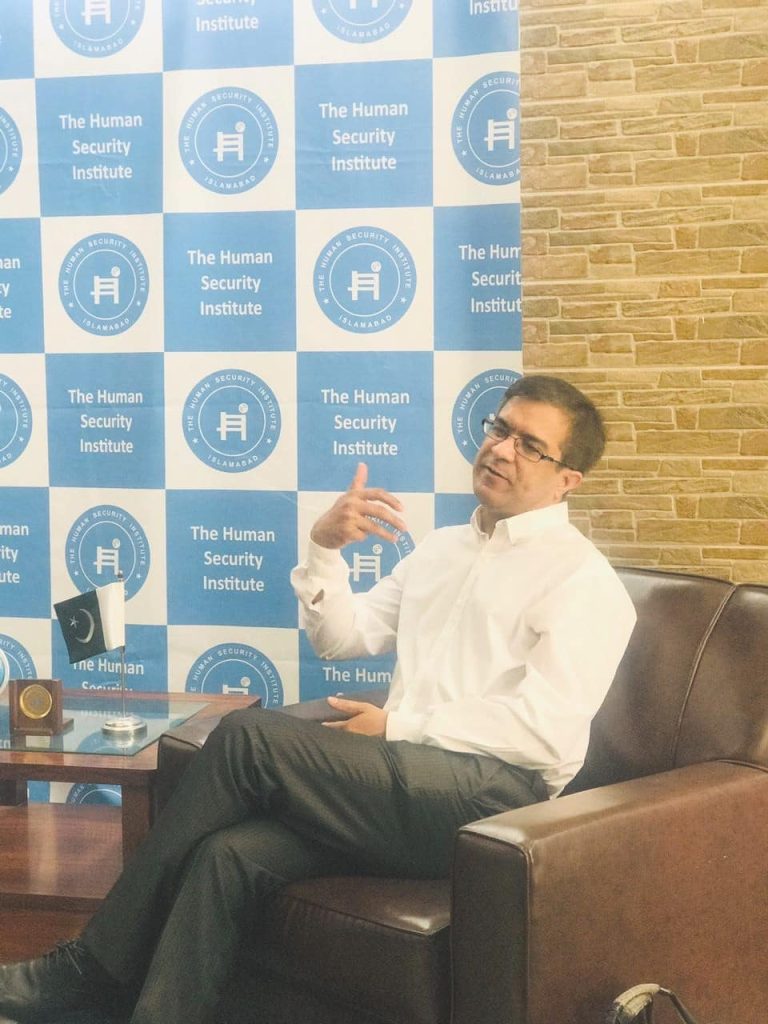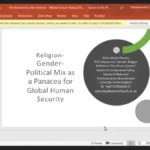Minutes of 3rd Lecture of Lecture Series on Tracing the theoretical roots of Human Security, Rethinking security, and response to COVID 19, A Human Security Threat
Guest Speaker: Dr. Saeed Ahmed Rid
Date: April 23, 2021
Time: 1300Hrs
Theoretical Roots of Traditional Security:
Roots of traditional security can be found in the writings of realists like Thomas Hobbes and Machiavelli. Realist theorists have a very pessimistic approach towards state and security. Thomas Hobbes gave the theory of social contract where he concluded that human is selfish by nature, a war of all against all. Similarly, Machiavelli, another realist said that there is no place for ethics and morality in the world politics.
Hans Morgenthau, another realist claims that the Global Politics is power politics- a Struggle for Power. Realists emphasize on the Three S’s of Realism (Statism, Survival and Self Help). It is safe to assume that the traditional approach of security is security achieved through Armament.
Theoretical Roots of Non-Traditional Security:
Traditional security focuses on state as a main contender in international politics and disregard the significance of the other elements of security. Nontraditional security focuses on other aspects of security such as the human aspect of security. Theorists like john Locke and Emmanuel Kant proposed the idea that human is cooperative by nature, and they rejected the notion that global politics is only a power struggle between states in the international system. Nontraditional theorists supported the overthrow of nation-state system and establish a Cosmopolitan Society. They have also debated on human equality and dignity. Social-Psychological Approach and Conflict Resolution:
Herbert C. Kelman (1965) focused on the study of the “human dimension” in international relations and introduced social psychology approach. The idea behind this approach is to reduce the prejudices between the two parties in a conflict.
John Burton first ever used the problem-solving workshop (although it was not named as such then) was held in December 1965 to discuss Southeast Asian conflict between Indonesia and Malaysia.
Social- psychological theory helped emerge many approaches and theories to nontraditional way of conflict resolution. Some of them are given below.
- Unofficial Diplomacy
- Community Relations (Early 1960s Northern Ireland, UK)
- Interactive Problem-solving (Burton 1969 and Kelman 1986)
- Citizens diplomacy
- Track two diplomacy
- Multi-track diplomacy
- Interactive Conflict Resolution
- Conflict Transformation
Journey from Traditional Security to Human Security:
Barry Buzan and Ole Wæver were the key figures behind the influential Copenhagen School of security studies talked about three levels of security individuals, states and international systems and added Political, Military, Economic, Societal, and Environmental dimensions to the concept of security.
Rethinking Human Security:
Rethinking human security is a UK based groups of organizations, academics, and activists. They have criticized the realist paradigm of security and provided an alternate security paradigm where they work for peace and justice in the world. They say that no state is secure if the world is not a secure place because national interests defined by political establishment is problematic as it is specific, not holistic. For example, the response to Al-Qaeda by the US after 9/11 was from traditional stand point, which resulted in the a vast array of problems throughout the middle east. The events occurring in Iraq and middle east in general solidifies the notion that national interests promote offensive military policies.
A holistic security approach also considers the well being of people in their social and economic aspects. A collective effort is required to build a long-term security policy where the concern of a common person is also considered and not just state.
Human Response and Covid-19:
our response towards the Corona Virus outbreak was war-like as we did not take it as a health security threat. Many nations including the regional and global powers responded towards the Covid-19 pandemic as it is a threat to their national security. Xi Jinping, the President and general secretary of the Communist Party of China declared China’s response as ‘people’s war’. Trump termed himself ‘a wartime president’ and compared the response required to combat coronavirus with World War II. Imran Khan termed Pakistan’s response as the war against coronavirus. A traditionalist, national security attitude was used to counter corona virus.
This attitude was very problematic. A threat to global heath security should be taken in its real essence which is to counter it with effective preventive measures to control and contain the virus, not fight it. A pandemic does not have a physical existence, hence can not be fought in a physical manner. Narrative plays an important role when facing a security threat, as it shapes the whole attitude toward that threat. For undertaking health related precautions, it was necessary for the people of Pakistan to take the coronavirus threat seriously and for that they perhaps should get scared (darna) of it a little. A war and a pandemic require a completely different strategy, hence a different diction and a different narrative.





